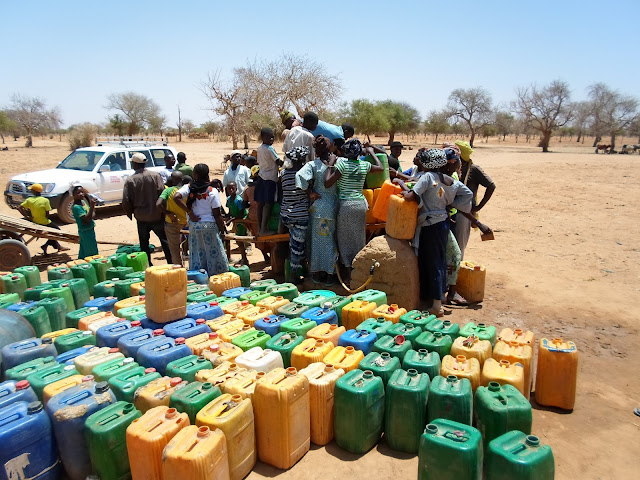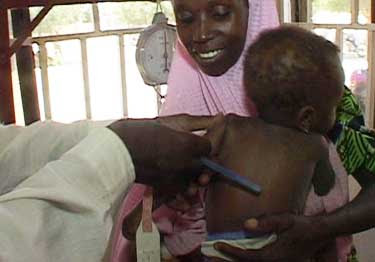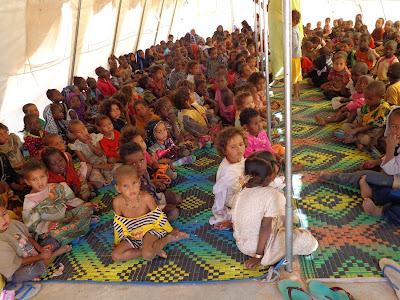 Tackling hunger in the Sahel: the challenge of resilience
Tackling hunger in the Sahel: the challenge of resilience
By Technical Cooperation and Development
Food crisis, drought, chronic hunger, rising food prices: the Sahel region continues yet again to suffer from recurrent food and nutrition crises. After 2005 and 2010, the populations of the Sahel region have had to face yet another crisis in 2012, following a disastrous agricultural season in 2011. The succession of droughts leads to inevitable negative consequences for the capacities of millions of people to meet their essential food needs in the Sahel region of West and Central Africa: drought leads to a reduction in agricultural production and rising food prices on consumption markets which affects the most vulnerable households that are highly impacted by the rise in commodity prices.
The food crisis of 2012 in the Sahel, in Niger, Chad, Sudan as well as Mali, Mauritania and Senegal, considerably deteriorated the food security situation of some 18 million people and led to a rise in mortality for undernourished children. At the height of the crisis in mid-2012, certain areas of Mauritania, North Mali and the Sahel region in Chad were faced with “extreme” food insecurity, the level before “famine”, while many other areas were considered to be in “critical” situations.
A major crisis has nevertheless been avoided thanks to humanitarian actors’ mobilisation through emergency interventions. However, despite a good rainy season and a relatively good agricultural and pastoral 2012/2013 season, the negative effects of the food crisis in the Sahel in 2012 are still being felt and lead to difficult access to food and necessary nutriments for the vulnerable populations, especially during the lean period, the time between the stock depletion and the following crop.
A chronic and structural food crisis
The Sahel is facing chronic food insecurity and high malnutrition levels, even during good agricultural seasons. In Chad, even though the production levels rose by 91% since the previous year, 2.1 million people are suffering from food insecurity, including 1.5 million in the Sahel region. In the most affected regions such as the Batha region, over 50% of the population cannot cover their daily basic food needs. In Mali, 2 million people are suffering from food insecurity and the maternal and child mortality rate is one of the highest in the world (13th country out of 136).
The series of crises is a first factor of chronic vulnerability for households in the Sahel region. The frequent food and nutritional crises do not allow vulnerable populations to have enough time to recover and thus contribute to a progressive erosion of their livelihoods. On top of these recurrent food crises, other external shocks also contribute to the reduction of the populations’ resistance capacities. The combination of climate, sanitation, social or economic factors such as the lack of basic infrastructure or services can explain the continued food insecurity that reigns in the Sahel region.
Political instability in the region (political crises, conflict, violence, population displacement, refugees, etc.) also contribute to render the security and humanitarian situation more complicated and to reduce the possibility to set up long-term solutions.
 |
| Douentza Mali (OCHA Mali) |
These structural and cyclical factors led to the worsening of the general food and nutrition situation for the populations in the region in 2012, whose livelihoods are eroded, and who have to then turn to self-destructive survival methods such as debt, selling their productive assets such as livestock, reducing their daily food intake, consuming poorer seeds or foods, etc. These irreversible methods also impede on the populations’ capacity to recover and prepare for a future crisis.
Emergency responses help to tackle the effect of a cyclical crisis, and at best to avoid a major catastrophe by bringing short term responses (so-called quick impact projects) to the vital needs of the populations: food distributions or coupons, money transfers, protection of their productive assets, general cash distributions, food fairs, nutrition, as well as water, hygiene and sanitation interventions. However, it is neither sustainable nor desirable to bring an immediate response, with the risk of creating a dependency towards this type of aid.
Insufficient emergency responses: a mitigated assessment
Nowadays, the necessity to address the deep, structural causes of malnutrition and food insecurity in a multi-sector and sustainable framework, and not only in terms of emergency responses, lies in the ethos but also in real commitment. Structural development programmes have to be set up to enable the most vulnerable populations to resist to shocks and crises. Fostering resilience is also a way to facilitate long-term development.
Programmes that link humanitarian emergency relief and development have become scarce and difficult to implement, especially because of the restrictions imposed by certain donors with regards to the financing that limits the timeframe and ambition of the programmes, and thus the possibility of a sustainable response to a crisis.
Nevertheless, if situations such as the food crisis in the Sahel in 2012 allow decision-makers and donors to respond to such crises, they are also an opportunity to raise the awareness of these international actors to chronic food vulnerability situations. They also encourage using sustainable response mechanisms, by putting forward efficiency, relevance and the impact of the long-term development programmes to support populations in terms of productive capacities and resilience.
Addressing the causes of chronic vulnerability in order to reinforce resilience capacities
Responding to food and nutritional crises in a sustainable way underlines the need to tackle the structural causes of malnutrition and food insecurity in the area, as well as to assist populations in terms of their capacities to to deal with chronic stress (climate hazards, hunger gaps) and to shocks (food crises, armed conflicts, refugee influx), that are inevitable for some cases and are intrinsically linked to the recurrent drought in the region.
The objective is to foresee and prepare for these crises beforehand, to reduce their impact for the most vulnerable communities and to foster recovery after external shocks, by limiting the effects of food crises in the short and middle term in terms of health, income, means, development opportunities and household safety.
The response must be multi-sector and sustainable by focusing on a response to crumbling livelihoods, community development (rehabilitating infrastructure to relieve them from isolation, setting up and ensuring access to markets, creating groups of food farmers and providing storage buildings or managing natural resources, etc) and to foster infrastructure, and individual and collective capacities in terms of water, sanitation, health, education, etc. (strengthening the health system’s human and institutional capacities, improving access to water by building wells and increasing the network as well as building adapted infrastructure, etc).
This integrated approach includes improving food security (agriculture support, provision of seeds, tools and agricultural inputs, improving farming techniques, irrigation, diversification of livelihoods, livestock support and recapitalisation, distribution of fodder during the pastoral lean period, animal health, improved breeding techniques, etc..), supporting households’ economic recovery after a shock (for reconstruction / recapitalisation of livelihoods while avoiding the use of destructive survival strategies), the contribution to the fight against malnutrition (prevention, screening and management of acute malnutrition, sensitisation to good nutrition and hygiene practices and distribution of hygiene kits, support to health centres to improve the quality of the management of malnutrition and access to healthcare, etc..).
Resilience is the ability of people to emerge stronger from a crisis situation, or at least without being weakened by a crisis. Being resilient also means to be able to analyze one’s own vulnerability and adapt to a disturbed context (post-crisis). To do so, people must be familiar with the environment and the elements that could impact the future on a daily basis (by knowledge of past crises and recurrent crises). This requires the establishment of monitoring systems for disaster risk reduction and early warning systems to foresee crises that might occur with ad hoc mechanisms, but especially in the long term.
Financing to tackle resilience
The Sahel is now in a recovery phase whose outcome will determine the ability of people to cope with shocks created by a difficult environment and climate events that regularly hit the area. Allowing the implementation of programmes to promote resilience among the most vulnerable populations also requires an adaptation from the donors in the management of funds. This is an essential requirement to break the cycle of recurring food crises in the Sahel. We have to make this choice today to contain a predictable humanitarian disaster.
For more go to
http://www.acted.org/
Follow
acted on Twitter




















